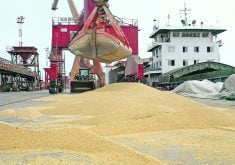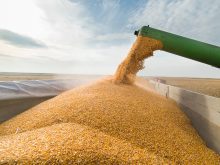McLeod Harvest Inc. has sold its three prototypes and hopes to go into full production of its grain harvest system this autumn.
The company has no doubt some farmers will order the $185,000 system, says company founder Bob McLeod.
“The science is behind us, the system works and the economics are conclusive,” said McLeod.
He has been developing the harvest system for six years. It is combination of a grain cart to carry chaff, grain and weed seeds and a threshing machine to separate them. It takes the place of a combine.
Read Also

Flax sector sees omega-3 opportunity
SASKATOON — A global shortage of omega-3 oils could be an opportunity for the flax sector, says an industry official….
Promoters say it can save farmers money by keeping grain that combines leave on the field, removing weed seeds from the field, and creating an animal feed source.
They also say it costs less to operate than a combine.
The McLeod system uses a 200 horsepower tractor to power the harvester.
Because of the amount of what the company calls “graff” collected by the harvester, the grain truck has to make three to four times as many trips, said Hamiota, Man., farmer Don Armitage, one of the three farmers who bought a prototype.
Overall the system pays off, said Armitage.
“The economics of the system are so good that you can’t afford not to.”
Cuts losses
Armitage reckoned the feed grain saving ability of the system to be worth about $11.50 per acre last year. This year, with feed grain prices skyrocketing, it could be worth $34.50 an acre.
The system keeps weed seeds off the field, but it will take a few years of operating before the reduced weed count is noticeable, he said.
If farmers do order the McLeod Harvest system, it will be manufactured by two companies in Manitoba and one in Alberta, each producing a different piece.
McLeod will continue engineering the system and marketing it.
McLeod said he saw big potential for the system outside of Canada.
“We think it’s going to revolutionize grain harvesting throughout the world,” said McLeod.
“It’s the first serious alternative to harvest grain since the combine was invented in 1836.”















